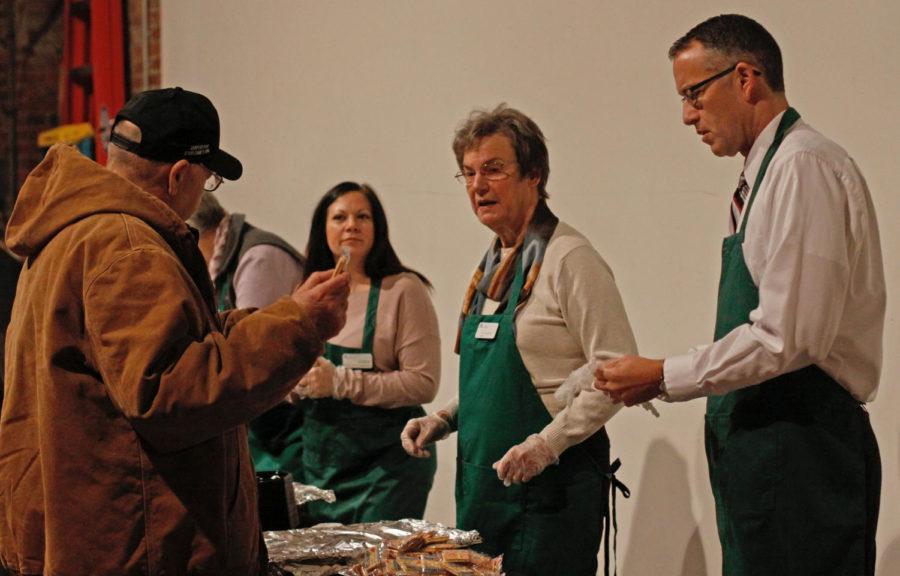- App Content
- App Content / News
- News
- News / Politics And Administration
- News / Politics And Administration / City
People in Ames in need of a place to stay
Jordan Zugmaier/Iowa State Daily
Mayor Ann Campbell and City Councilman Tim Gartin serve soup to attendees at the Scoop A Soup event Nov. 17, 2015, at City Hall. The event took place in conjunction with National Hunger and Homelessness Awareness Week.
March 23, 2017
Although it may seem hard to grasp to some students, homelessness is a growing problem in the city of Ames.
In the same city that boasts one of the most beautiful campuses in the country, the truth is many Ames residents are found not knowing where they will spend the night.
Carrie Dunnwald, director of the Ames Emergency Residence Project, sees firsthand the epidemic of homelessness that the Ames community is facing.
“Homelessness is a huge issue in Ames,” Dunnwald said. “In 2015-16, we’ve served 680 people alone.”
The Ames Emergency Residence Project (ERP) provides emergency shelter housing for men, women and families who have no place to stay. In addition, the organization provides assistance to those who find themselves close to homelessness.
Many in Ames find themselves just on the verge of homelessness. A statistic on the Ames ERP website claims that 5,900, or a quarter of all households in Story County, have an income low enough to qualify for Habitat for Humanity housing.
This alarming statistic has not been updated since Dunnwald took over for the agency, and she feels that number may be on the low side today.
“With how many applications we get every week for homeless assistance, and we are one of six agencies providing homeless assistance, I would say that seems pretty low,” Dunnwald said.
The issue of homelessness is not easy to define. Homelessness is an issue so many face, and for so many different reasons.
“The issue of homelessness looks as different as each person,” Dunnwald said. “We have some people living in tents, we have some people living in cars, we have some people living in boxes under bridges.”
There is no clear reason why a person may become homeless. Dunnwald said many homeless people are fully functioning with full-time jobs, while others are mentally ill and unable to get or hold a job.
Dunnwald feels homelessness is a growing problem in Ames. A large factor leading to this is the increasing cost of housing in the city. Another factor contributing to this problem is the simple fact that many jobs do not pay well enough for many to afford housing.
Another point Dunnwald brought up was that people used to be able to work a job at minimum wage and afford housing, which is not the case today.
“As long as those factors continue to worsen, it’s going to become more and more difficult for people already on the brink of poverty to get out,” Dunnwald said.
The affluence of Ames can sometimes seem to benefit many while hurting a minority. Another issue that leads to more people finding themselves homeless is the development of new property, sometimes over-existing cheaper property.
“A lot of the development that’s gone up that I’ve been aware of has been unaffordable housing for the people we are seeing,” Dunnwald said.
When looking at the solution to such a complex problem it can be hard to know where to start.
“I think it needs to be a community-wide effort first and foremost,” Dunnwald said.
One aspect in which Ames is succeeding is in the number of resources available to those struggling with homelessness, although these resources don’t always receive proper funding and are unable to help everyone.
Students wishing to help assist those struggling with homelessness can assist with the Ames Emergency Residence Project or any other agency that assists with homelessness in Ames.
“Any kind of way anyone wants to get involved we will take,” Dunnwald said. “It could be volunteering, advocating, donating items or getting involved in Reggie’s Sleepout this weekend.”
Reggie’s Sleepout is an annual event in which participants spend the night in boxes to spread awareness for homelessness. The fundraiser has been happening on Drake University’s football field, and this year, it will take place at Jack Trice Stadium for the first time.
Students are encouraged to donate, volunteer or just spend the night in a cardboard box at the event that lasts from 3 p.m. Saturday into Sunday morning.
















